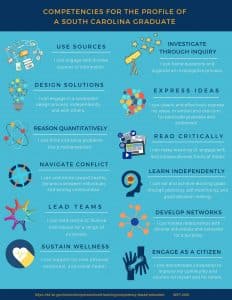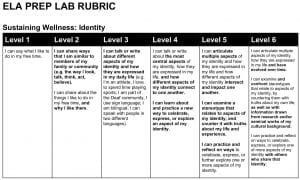Scaling and Spreading Equitable Practices Through the Profile of a South Carolina Graduate Competencies
CompetencyWorks Blog
This post originally appeared at #PersonalizeSC, the South Carolina Department of Education Office of Personalized Learning.
 Apryl Henry, a teacher, and Britt Collins, an instructional coach, at River Bluff High School in the Lexington One School District, chatted with us about their individual and collective journeys towards infusing the Profile of the South Carolina Graduate (PSCG) Competencies into classroom practices. Get inspired by Apryl’s approach to getting students to self-assess and demonstrate evidence of learning through competency rubrics and her methods for scaling and spreading this work across various organizations.
Apryl Henry, a teacher, and Britt Collins, an instructional coach, at River Bluff High School in the Lexington One School District, chatted with us about their individual and collective journeys towards infusing the Profile of the South Carolina Graduate (PSCG) Competencies into classroom practices. Get inspired by Apryl’s approach to getting students to self-assess and demonstrate evidence of learning through competency rubrics and her methods for scaling and spreading this work across various organizations.
Office of Personalized Learning: Tell us a little bit about your journeys with the competencies.
Apryl Henry: I started about three years ago and I worked with an instructional coach. That is something I’ve always been excited about: the partnership and having someone to talk to. Our coach invited me to this event that talked about the competencies and I learned a little bit about it. When Britt came into the role last year, she brought this idea of teaching an English Reading Prep Lab to prepare ninth graders for high school, and we wanted to use the competencies in that classroom. So I started diving in and incorporated it into my other classes and with other teachers.
Britt Collins: I went to an event at River Bluff a few summers ago where the Office of Personalized Learning (OPL) facilitated a workshop. So we talked about them there but I hadn’t seen them in action. And then last year I got to work with reDesign and OPL with the competencies in an existing Algebra Prep Lab and they started using them. I became fascinated with the idea of using the competencies to work towards mastery-based learning, but I also leveraged the idea of students self-assessing where they are and gauging their own growth.
It really just showed me how we should be structuring education across the board. We made the decision then to use the competencies in this English Lab. I have to brag on Apryl. She is fearless in her use of the competencies and that is the coolest part. She had such a broad view and vision of how to incorporate them into her classes. I largely credit Apryl with River Bluff’s adoption of the competencies –because of her fearless pursuit of using them in all of her classes, in prep lab, and all other content areas.
OPL: What connections do you see between the competencies and achieving educational equity?
Apryl: The competencies came at the right time, because I was coming to a turning point for myself as an educator. I was questioning practices I had seen in general and my own practices, where I had been unfair to students as far as grading them. I think the competencies really let me see all of my students and see what they are capable of, looking at them through a non-deficit lens. These kids come to me with skills. Just because they are not where they are supposed to be, I still want them to feel encouraged and know how they have grown in my classroom. I want them to know what they are truly capable of. I have students of all different levels and backgrounds in very different places. It made sense to use the competencies because they can start on the level that suits them. It opened up my eyes to the idea that every student can be successful.
OPL: How have you used the competencies in your class?
Apryl: In our Multimedia Publication class, for instance, it’s about getting to know the rubric and the skills we are evaluating. It starts with a self-assessment and asking, “Where do you see yourself on this rubric and what does this mean?” I have them provide evidence to show how they have grown. If you say you’re a level 3, can you show me evidence of that? We also do peer assessment, and their peers may think they are at a level 4 because they say, “I can see you do this and this, so that is evidence of a level 4.” Then I assess them as well. Going over the rubric and thinking about what does this mean and what does it look like is the largest part of our competency implementation.
See rubrics for three competencies from the ELA Prep Lab.

OPL: How do you go about structuring and scheduling this work?
Apryl: We are on a block schedule due to the pandemic. I only have them for a semester, so I don’t come into contact with them as often as I would in a yearlong class. I use the Expressing Ideas Continuum a lot, so by the end of the semester, they know what I am looking for. We had six summative assessments, and they see the Expressing Ideas Continuum for each one we do. I use the competencies as a guide for the skills piece of the projects.
I definitely do not cover all the skills at one time. I work closely with Britt and Melissa Slater at reDesign. They help me with creating my own rubrics based on them. So I think about, “What is the main focus for this one?” and we think about what skills are there. We try not to give them the whole continuum at one time.
Students use a rubric aligned to the competencies to self-assess for projects.
![]()
See the full Black-American Icons Poster rubric.
OPL: How have the students responded to this?
Apryl: The kids thought it was strange at first to rate themselves. Sometimes they don’t engage with the rubric until the assignment is due. I think it was a little bit strange for them, but once they started looking at the language and saying, “You know what? I can do this and I’ve done this before. Before we had the rubric, I didn’t know what was what was causing me to get the grade I want or causing me to not get the grade I want.” I think they enjoyed knowing why.
OPL: How do you feel the competencies are helping your students achieve the Profile of the South Carolina Graduate?
Apryl: The competencies are so easy to use in all content areas and all areas of life. I’ve told them that if you are expressing ideas in this paper, you also need to do so when you talk to your parents or go for a job interview. Making them relatable and have the real-world value is important.
Britt: I think the competencies enable us to measure growth in all aspects. I like them so much because I realized that, in the past, I had been the one determining the amount of growth my students needed. It was an epiphany for me when we started to craft concepts around students determining their own level of growth and celebrating that growth – celebrating any and all growth in all aspects of an assignment. The competencies provide the criteria for our learning targets, so they allow the students to truly understand what we are trying to get them to master. It provides clarity.
OPL: How are you intentionally scaling and spreading this work?
Apryl: I typically fly under the radar, but this year I decided I had to do something. I started a group with another teacher and we started this group called Coalition of Diverse Educators, which is a district-wide group. Through that group, I have promoted the competencies. I posted information about them so teachers in the district know about them.
We have a group at our school called the Disrupting Inequity Action Team that started from a book club based on Stamped From The Beginning. We are a coalition of teachers interested in promoting equity. We talk about the competencies in that group. I am happy to say that we have competencies in every area, except for PE and special education.
Britt: I think having someone who is so well-versed and confident in the competencies is essential. Using Apryl as a resource is helpful. She provides examples of what it can look like. I think that 99% of the time when a teacher comes to us and says they are interested in working with the competencies, we can help them create materials to use. Then we can also use those resources for ourselves or for others.
Want to hear more from Apryl and Britt? Listen to PersonalizeSC’s podcast episode with them here: https://anchor.fm/personalizeSC
Learn More: